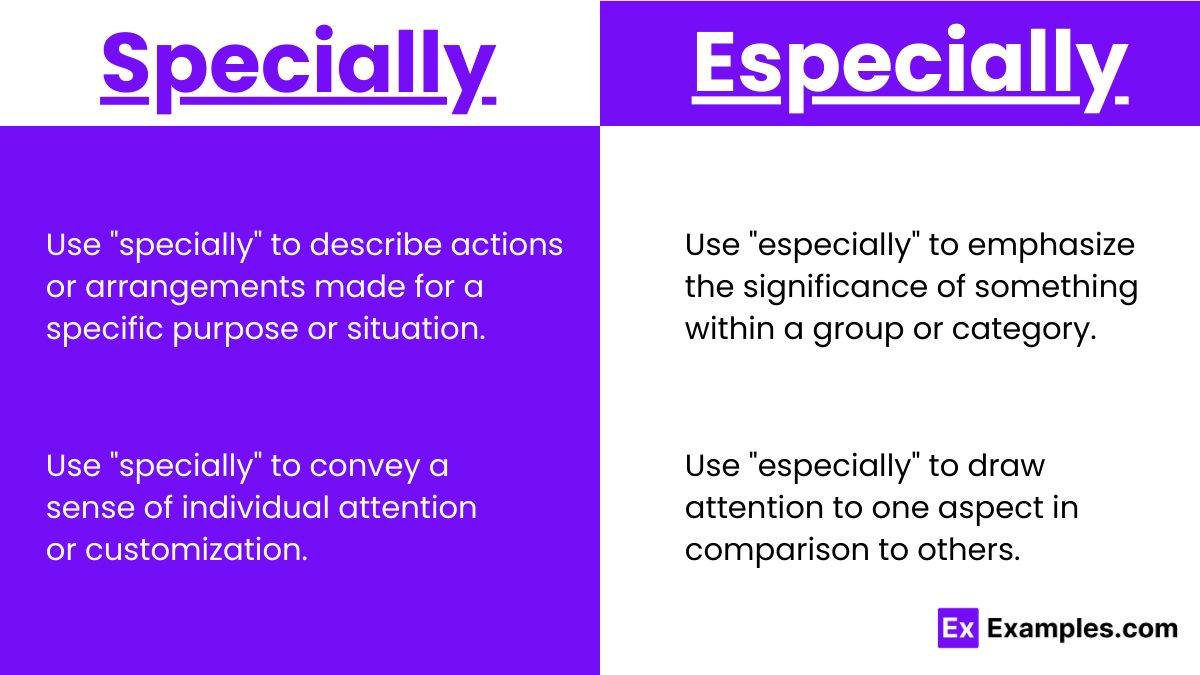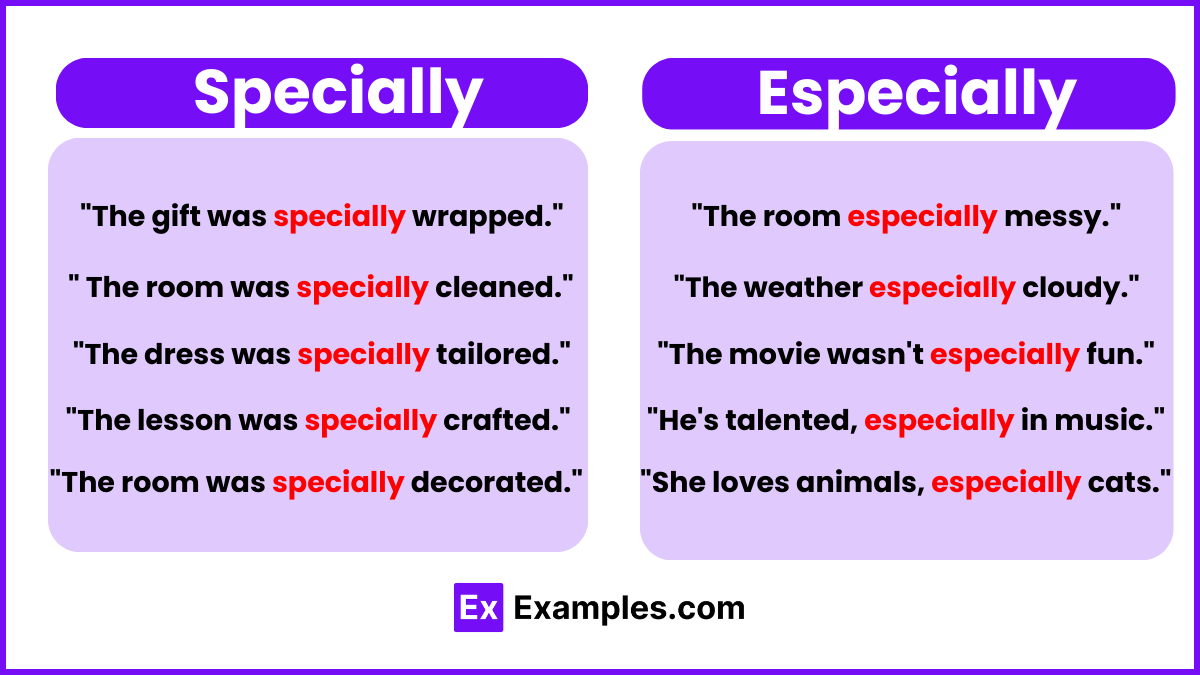Specially vs Especially – Meanings, Differences, Usage, Examples
Understanding the differences between ‘Specially‘ and ‘Especially‘ is fundamental as they denote distinct concepts despite their similar appearances. While both are adverbs indicating special significance, they are employed in different contexts and carry different implications. ‘Specially’ suggests something done for a specific purpose or in a particular manner, whereas ‘especially’ indicates something done to a noteworthy degree or primarily.
Specially and Especially – Meanings
- Specially: This adverb is used to indicate something done for a particular purpose, person, or situation. It implies that something has been chosen or designed specifically for a particular case.
- Especially: This adverb is used to emphasize something, indicating that it is more important, significant, or exceptional compared to others. It implies a degree of distinction or superiority.
Summary
How to Pronounce Specially and Especially
- Specially: Pronounced as /ˈspɛʃ(ə)li/ (SPE-shuh-lee).
- Especially: Pronounced as /ɪˈspɛʃ(ə)li/ (ih-SPE-shuh-lee).
Differences between Specially and Especially
| Aspect | Specially | Especially |
|---|---|---|
| Purpose | Indicates particularization. | Indicates distinction or superiority. |
| Emphasis | On specific intent or design. | On significance or exceptional quality. |
| Context | Tailored or customized instances. | Instances of heightened importance. |
| Modification | Modifies verbs or adjectives. | Often modifies entire clauses or sentences. |
| Intention | Indicates something designed or prepared with intent. | Indicates something noteworthy or remarkable. |
How to Remember the Difference between Specially and Especially
- Specially: Think of “specially” as focusing on something specific or special. The word “special” is embedded within it, which reminds you that it’s about something unique or customized.
- Especially: The word “especially” is like “extra special.” It emphasizes one thing over others, highlighting its significance.
When to Use Specially and Especially

Usage of Specially
- Tailored Actions: Use “specially” to describe actions or arrangements made for a specific purpose or situation.
- Customized Consideration: Employ “specially” when something is done in a unique or distinct manner.
- Personal Touch: Use “specially” to convey a sense of individual attention or customization.
- “Specially” is commonly used in contexts where something has been modified or adapted to suit unique needs.
Usage of Especially
- Highlighting Importance: Use “especially” to emphasize the significance or primacy of something within a group or category.
- Exceptional Circumstances: Employ “especially” to denote something done to a notable degree or particularly.
- Comparative Emphasis: Use “especially” to draw attention to one aspect in comparison to others.
Specially and Especially – Examples

Specially Examples
- The hotel staff prepared a specially decorated room for the newlyweds.
- The chef prepared a specially crafted menu for the VIP guests.
- The tailor made a suit specially tailored to the client’s measurements.
- The teacher designed a specially adapted curriculum for students with learning disabilities.
- The doctor prescribed a specially formulated medicine for the patient’s unique condition.
Especially Examples
- She loves all animals, especially dogs and cats.
- I enjoy all kinds of desserts, especially chocolate cake.
- He’s an avid reader, especially of science fiction novels.
- The weather forecast predicts rain, especially in the afternoon.
- She’s talented in many areas, especially music and painting.
Exercise
- I made this dish __________ for you, taking into account your dietary restrictions.
- The dessert was prepared __________ for the occasion.
- This area is known for its scenic beauty, __________ during autumn.
- She loves all animals, __________ cats and dogs.
- His work is impressive, __________ his attention to detail.
Answers
- specially
- specially
- especially
- especially
- especially
FAQ’S
Can I Start a Sentence with Especially?
Yes, you can start a sentence with “especially” to emphasize a particular point or circumstance, adding emphasis and clarity to your message.
Can Specially and Especially Be Used Interchangeably?
While they share similarities, “specially” often refers to something done for a particular purpose, while “especially” emphasizes significance or distinction.
What Is the Difference Between Special and Especial Person?
“Special” generally denotes uniqueness or importance, while “especial” emphasizes exceptional qualities, often in a more formal or literary context.
Where Do We Use Specially?
“Specially” is used to indicate something done for a particular purpose or in a distinctive manner, highlighting uniqueness or intentionality in actions or situations.


